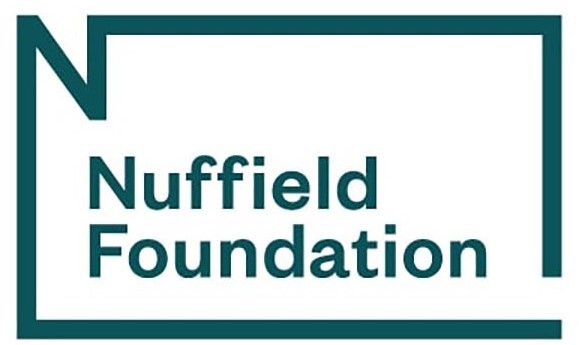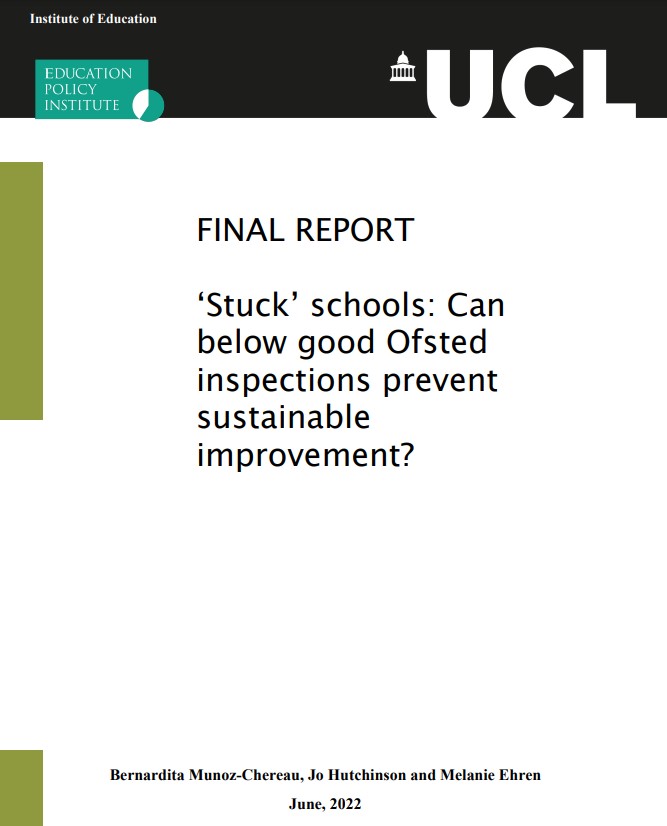The Education Policy Institute (EPI) and UCL Institute of Education ( UCL IOE) have published a new report on “‘Stuck’ schools”, funded by the Nuffield Foundation. It reveals schools that have received a series of below good Ofsted grades often end up in a cycle of challenging circumstances and limited improvement.
The study explored the underperformance of 580 schools in England that consistently received less than good Ofsted inspection grades between 2005 to 2018. The report finds that ‘stuck schools’ often face more challenging circumstances including higher teacher turnover, higher levels of disadvantaged pupils and pupils with special educational needs. However, ‘stuck schools’ are not unique. Many other schools share most of these challenges but have managed to avoid a continuous cycle of less than good inspection judgements.
After the initial negative Ofsted grade, the study found that the intake of a school tends to become more disadvantaged and teacher turnover increases, both of which contribute to the difficulty in reversing the negative Ofsted judgement. The longer the school continues to have the less than good rating, the harder the process of school improvement becomes.
However, the research also finds that a poor inspection judgement is only a modest contributing factor of ‘stuck’ schools’ lack of improvement or decline over time.
Joining a multi-academy trust showed small positive effects for secondary schools, in relation to lower teacher turnover and a lower chance of remaining ‘stuck’ in subsequent Ofsted inspections. There were no similar, positive effects for stuck primary schools that joined a multi academy trust. These findings show, yet again, that academisation is not a silver bullet to deliver school improvement and the government should consider these results to help inform its future policies around academisation and school improvement.
The report offers a series of policy recommendations for DfE and Ofsted, encouraging increased holistic support for ‘stuck’ schools, including peer-to-peer guidance, and greater understanding of the impact the negative judgement can have.
The full report can be accessed here.
Key findings
- ‘Stuck’ schools face a combination of unusually challenging circumstances characterised by: a) instability (higher teacher turnover, pupil mobility and governance change rates); b) poverty (higher pupils’ free school meals and poor neighbourhood rates); c) higher rates of children with low-level Special Educational Needs and Disability); d) challenging locations (middle-sized urban areas rather than large cities or rural; and e) slightly higher funding (a little more overall and per-pupil funding) compared to not-’stuck’ schools.
- ‘Stuck’ schools are distinctive but not unique. Many other schools share most of ‘stuck’ schools’ challenging circumstances but have managed to avoid a continuous cycle of less than good inspection judgements.
- The presence of good or outstanding neighbourhood schools is more important in predicting whether a school will become ‘stuck’ than ‘stuck’ schools’ own performance.
- A less than good inspection judgement is a modest contributing factor of ‘stuck’ schools’ lack of improvement or decline over time.
- Stuck’ schools’ trajectories are diverse and these differences matter, as most case studies schools contested and didn’t identify with the metaphor of being ‘stuck’.
- According to Ofsted inspection reports, case study ‘stuck’ schools need primarily to improve their Outcomes/achievements/quality of education.
- Monitoring inspections and full inspections received by ‘stuck’ case study schools were arguably too frequent, variable and inconsistent.
- Many headteachers, teachers, and governors of ‘stuck’ and ‘un-stuck’ schools valued the role of Ofsted and other support received to improve.
- Some stakeholders raised concerns about the validity, reliability and fairness of inspections.
- ‘Stuck’ schools can get ‘un-stuck’ given the right time and support.
Policy recommendations
For DfE:
- Consider whether there is adequate support, including financial support, for ‘stuck’ schools, particularly ‘stuck’ secondary schools whose per-pupil funding is only marginally higher than other secondary schools. Given that funding is attached to pupil enrolment and ‘stuck’ schools are under subscribed, significantly increasing funding could help them become good.
- Help ‘stuck’ schools learn lessons from the experience of ‘un-stuck’ schools through creating networks and disseminating best practice guidance to successfully tackle similar challenging circumstances.
- Consider what more can be done to stabilise ‘stuck’ schools’ staff. Reducing excessively high teacher turnover, including loss of key staff and governance changes needs to happen before the school can improve.
- Review the positive and negative impact of academization on ‘stuck’ schools to gain insights from the experiences in primary compared to secondary schools.
For Ofsted:
- Ensure that inspectors are properly trained to understand the significance and implications of schools working in very challenging circumstances, and the positive role they can play to support schools in their improvement journey.
- Consider what other positive support can be given to ‘stuck’ schools to assist in their improvement journey, including linking them with schools that have become ‘un-stuck’ or those that have specific expertise in areas that are core challenges, such as supporting children with EAL and/or refugee backgrounds.
- Revise the cycles of full section 5 inspections and monitoring section 8 inspections to give time to implement improvements. Avoid: a) transforming monitoring into too frequent inspections and over-surveillance; b) too much variation in the number of inspections and across inspectors; and c) providing false hope in monitoring inspections.
- Consider what changes in inspection can be implemented to avoid the detrimental effect that a series of below good Ofsted grades is having on school improvement, especially for schools working in challenging circumstances such as ‘stuck’ schools.
This report is funded by the Nuffield Foundation.
The Nuffield Foundation is an independent charitable trust with a mission to advance social well-being. It funds research that informs social policy, primarily in Education, Welfare, and Justice. It also funds student programmes that provide opportunities for young people to develop skills in quantitative and scientific methods. The Nuffield Foundation is the founder and co-funder of the Nuffield Council on Bioethics and the Ada Lovelace Institute. The Foundation has funded this project, but the views expressed are those of the authors and not necessarily the Foundation.



